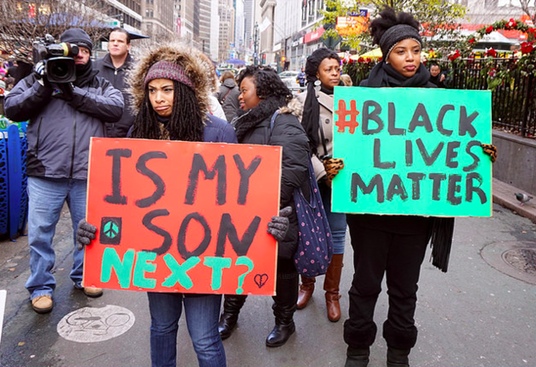The conclusions drawn from a Dec. 23 article by Michelle Conlin, writing for Reuters, was as predictable — at least for me and probably many other African Americans — as the sun coming up in the morning. The title of the article sums up the gist of the piece succinctly: Off Duty Black Officers In New York Say They Fear Fellow Cops.
In the article, Conlin wrote, “What’s emerging now is that, within the thin blue line of the NYPD, there is another divide — between black and white officers.” Anyone who knows any black cops, and are trusted enough by them so they feel comfortable speaking freely, have heard the exact same sentiment expressed by black cops in Cleveland … and probably any other city in America.
The writer interviewed black cops all over New York City and heard the same refrain over and over: “black NYPD officers saying they have experienced the same racial profiling that cost Eric Garner his life.”
In doing research for the article Conlin says she “interviewed 25 African American male officers on the NYPD, 15 of whom are retired, and 10 of whom are still serving. All but one said that, when off duty and out of uniform, they had been victims of racial profiling, which refers to using race or ethnicity as grounds for suspecting someone of having committed a crime.
“The officers said this included being pulled over for no reason, having their heads slammed against their cars, getting guns brandished in their faces, being thrown into prison vans and experiencing stop and frisks while shopping. The majority of the officers said they had been pulled over multiple times while driving. Five had had guns pulled on them.”
When Conlin attempted to interview the normally outspoken Patrick Lynch — the head of New York’s Patrolmen’s Benevolent Association — for the article, he declined the request for a comment … a fact that should come as no surprise to anyone. Any opinions that don’t jibe with the police union party line are — in his eyes — not valid, even if they come from other — albeit black — officers. Lynch would not respond simply because he cannot conveniently explain the despicable behavior away.
This willful blindness on the part of Lynch and others of his ilk is primarily responsible for the sad state of relations between white cops and the black community, and not just in New York City. No problem can be rectified if it first won’t be recognized, which seemingly is just fine with too many white cops. Rather than coming clean and admitting what virtually every sane, fair-minded person in America realizes and admits — that some white cops are rogues — their response is always to circle the wagons, hide behind the flag, and hunker down until the controversy blows over. And they take this intransigent position because, unfortunately, it has served them so well in the past. They’ve always been able to simply ride the storm out and then continue business as usual.
Police supporters point out that while blacks made up 73 percent of the shooting perpetrators in New York in 2011 they were only 23 percent of the population. However, while that statistic is sickening and should be of great concern for everyone, still, the percentage of blacks engaged in such madness is a minuscule portion of the wider black community and does not justify characterizing — or suspecting — all blacks based on the actions of a few. In no way does it justify racial profiling and the killing of often-unarmed blacks.
Conlin cites the work of social psychologists from Stanford and Yale universities and the John Jay College of Criminal Justice, who have conducted research – including the 2004 study “Seeing Black: Race, Crime and Visual Processing” — which shows “there is an implicit racial bias in the American psyche that correlates black maleness with crime.”
She also cited a 2010 New York State Task Force report on police-on-police shootings — the first such inquiry of its kind — that found that in the previous 15 years, officers of color had suffered the highest fatalities in encounters with police officers who mistook them for criminals.
“People who have taken part in the marches against Garner’s death — and that of Ferguson teenager Michael Brown — say they are protesting against the indignity of being stopped by police for little or no reason as much as for the deaths themselves,” wrote Conlin.
Speaking with a group of black police officers from across the city as they gathered for the beer and chicken wing special at a Brooklyn pub, Conlin reports “they discussed how the officers involved in the Garner incident could have tried harder to talk down an upset Garner, or sprayed mace in his face, or forced him to the ground without using a chokehold. They all agreed his death was avoidable. ‘That could have been any one of us.’”
The troubling point of Conlin’s excellent article is that … if even black police officers don’t feel safe from violence being perpetrated against them by white fellow officers (who obviously indiscriminately harass blacks randomly, rather than spend their time focusing on real crime), how can any black male feel safe walking the streets of America?
[Photo: The All Nite Images (Flickr)]
 From Cool Cleveland correspondent Mansfield B. Frazier mansfieldfATgmail.com. Frazier’s From Behind The Wall: Commentary on Crime, Punishment, Race and the Underclass by a Prison Inmate is available again in hardback. Snag your copy and have it signed by the author by visiting http://NeighborhoodSolutionsInc.com.
From Cool Cleveland correspondent Mansfield B. Frazier mansfieldfATgmail.com. Frazier’s From Behind The Wall: Commentary on Crime, Punishment, Race and the Underclass by a Prison Inmate is available again in hardback. Snag your copy and have it signed by the author by visiting http://NeighborhoodSolutionsInc.com.
